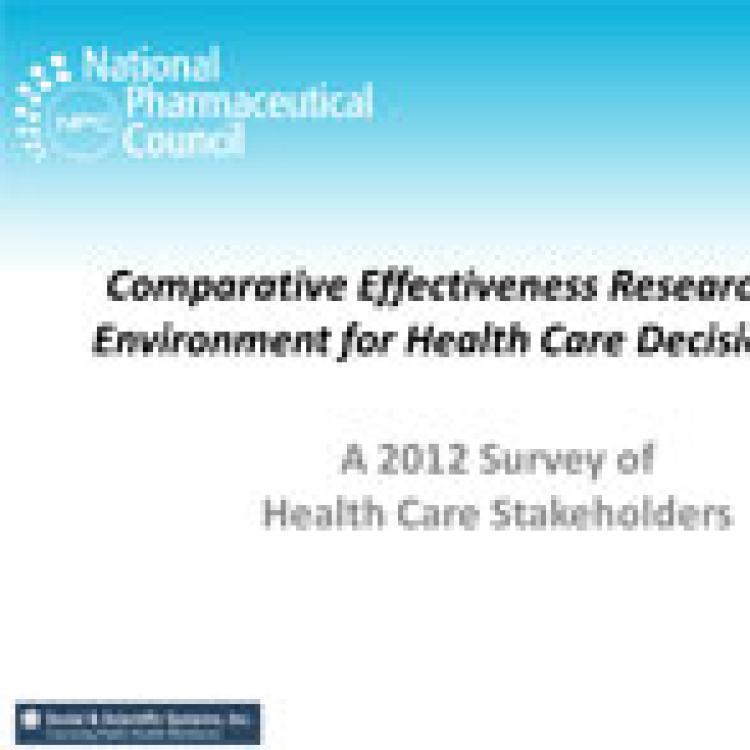Authors: National Pharmaceutical Council, Social & Scientific Systems
Publication: March 2012 Size: 22 slides (PDF) [Watch the 30-min. webinar]
In its second annual survey of key health care stakeholders, NPC, working with the public health research firm Social & Scientific Systems (SSS), examined the environment for health care decisions, especially the current state of CER and its impact on medical decision making.
The purpose was to set a baseline for where key stakeholders believe we are today on CER and for tracking progress and judging future effects. According to the findings, there is clear recognition among key health care influentials about the importance of CER and its promise for the future. These stakeholders also expressed tempered optimism about progress in efforts to provide or improve the tools necessary for this research, and that any significant effects of CER are yet to be realized, and much work remains to be done.
CER Survey Highlights:
In its second survey to gauge attitudes around comparative effectiveness research (CER), the National Pharmaceutical Council was able to capture shifts in the conversation.
CER continues to be a key issue of importance to stakeholders, but perceived importance has leveled off between 2011 and 2012.
- More than half (53 percent) of survey respondents were “very familiar” with comparative effectiveness research and one-third of respondents were “somewhat familiar” with CER.
- Of survey respondents, 95 percent said that CER was “somewhat” or “very important” to them or their organizations, a small increase from the 91 percent cited a year earlier.
- However, the percentage that said CER was very important was lower than in the previous survey, declining from 71 percent to 64 percent.
The Patient Centered Outcomes Research Institute (PCORI) continues to be recognized as an important player in CER.
- Audiences who were “somewhat” to “very” familiar with PCORI rose by 8 percent over last year, increasing from 70 percent to 78 percent.
- Between the 2011 survey and the 2012, PCORI showed the biggest jumps in recognition in key areas, compared to other organizations including the Agency for Healthcare Research and Quality (AHRQ), National Institutes of Health (NIH), Food and Drug Administration (FDA), private payers, academia and pharmaceutical industry.
- Stakeholders’ expectations of PCORI’s influence jumped most dramatically in two areas:
- Establishing research standards – from 50 percent to 72 percent
- Funding and monitoring research – from 44 percent to 60 percent
However, in key areas of importance, PCORI has yet to assume a leadership position among stakeholders. Survey respondents ranked who they thought would be the most important influencers in the next five years within these areas:
Who will help establish research standards around CER?
- AHRQ (83 percent)
- PCORI (72 percent)
- NIH (60 percent)
Who will establish research priorities?
- AHRQ (77 percent)
- NIH (71 percent)
- PCORI (67 percent)
Who will fund and monitor research?
- NIH (85 percent)
- AHRQ (74 percent)
- Pharmaceutical Medical Products Industry (66 percent)
(PCORI was rated 60 percent)
Who will conduct comparative effectiveness research?
- Academia (88 percent)
- Pharmaceutical Medical Products Industry (70 percent)
- NIH (50 percent)
Expectations are still strong that CER will improve health care decision-making, but few expect that impact to be felt soon.
- In the next year, only 30 percent of respondents felt CER would moderately or substantially improve health care decision-making
- In the next three years, 77 percent expected improvement
- In the next five years, 91 percent expected improvement
CER Survey Parameters:
The survey, conducted from October 2011-February 2012, targeted key stakeholders who have an impact on, or are affected by, research involving medical effectiveness, including researchers/thought leaders; government; insurers and health plans; employers; business coalitions/HR specialists; and associations/trade groups. A total of 117 stakeholders participated.
